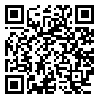Volume 12, Issue 1 (spring 2025)
J Prevent Med 2025, 12(1): 63-72 |
Back to browse issues page
Download citation:
BibTeX | RIS | EndNote | Medlars | ProCite | Reference Manager | RefWorks
Send citation to:



BibTeX | RIS | EndNote | Medlars | ProCite | Reference Manager | RefWorks
Send citation to:
Hemmatipour A, Rajabi H, Jahangirimehr A, Moradi H, Hamidinia H, Shirmohammadi M. The Effect of Implementing Entrepreneurship and Technology Workshops on Creativity and Ideation of Students at Abadan University of Medical Sciences. J Prevent Med 2025; 12 (1) :63-72
URL: http://jpm.hums.ac.ir/article-1-827-en.html
URL: http://jpm.hums.ac.ir/article-1-827-en.html
Akram Hemmatipour1 

 , Halimeh Rajabi2
, Halimeh Rajabi2 

 , Azam Jahangirimehr *3
, Azam Jahangirimehr *3 

 , Hamed Moradi4
, Hamed Moradi4 

 , Hadis Hamidinia5
, Hadis Hamidinia5 

 , Marzieh Shirmohammadi6
, Marzieh Shirmohammadi6 




 , Halimeh Rajabi2
, Halimeh Rajabi2 

 , Azam Jahangirimehr *3
, Azam Jahangirimehr *3 

 , Hamed Moradi4
, Hamed Moradi4 

 , Hadis Hamidinia5
, Hadis Hamidinia5 

 , Marzieh Shirmohammadi6
, Marzieh Shirmohammadi6 


1- Master of Nursing, Department of Nursing, Clinical Research Development Unit of Valiasr Educational Hospital, Abadan University of Medical Sciences, Abadan, Iran
2- PhD in Biology, Abadan University of Medical Sciences, Abadan, Iran
3- MSc in Biostatistics, Department of Public Health, Shoushtar faculty of Medical Sciences, Shoushtar, Iran
4- MSc in Biomedical Engineering, Abadan University of Medical Sciences, Abadan, Iran
5- BS in Environmental Health, Department of Environmental Health, Abadan University of Medical Sciences, Abadan, Iran
6- MSc in Educational management, Abadan University of Medical Sciences, Abadan, Iran
2- PhD in Biology, Abadan University of Medical Sciences, Abadan, Iran
3- MSc in Biostatistics, Department of Public Health, Shoushtar faculty of Medical Sciences, Shoushtar, Iran
4- MSc in Biomedical Engineering, Abadan University of Medical Sciences, Abadan, Iran
5- BS in Environmental Health, Department of Environmental Health, Abadan University of Medical Sciences, Abadan, Iran
6- MSc in Educational management, Abadan University of Medical Sciences, Abadan, Iran
Abstract: (458 Views)
| Introduction: Entrepreneurship is a process in which a person with a new idea introduces a product to the market. Creativity is an inseparable part of entrepreneurship and is fundamental to any change or innovation. Methods: In this quasi-experimental study, 54 students from different fields were enrolled through convenient sampling and divided into two groups of 27 people, intervention and control, by simple randomization and were matched as much as possible. The intervention group underwent training for four months. The creativity levels of both groups were measured and evaluated by completing a questionnaire (Iranian Entrepreneurs Personality Assessment) before and after the last training session. The students' ideas were presented and recorded at the university's entrepreneurship event. Data were analyzed using statistical tests with SPSS version 26 software. Results: Of the participants, 36 (66 %) were female, and their mean age was 21.45 ± 1.9 years. The mean creativity in the intervention group was 46.52 ± 4.58, and that in the control group was 47.12 ± 4.63. After training, the mean changed to 51.36 ± 3.12 in the intervention group and 46.8 ± 2.59 in the control group. The level of creativity in the intervention group increased significantly compared to that in the control group after the training (P=0.001). Only 17 (65.4%) students in the intervention group presented their ideas at the entrepreneurship event. Conclusion: Considering the research results on improving and increasing students' creativity and ideation and the clear effect of training on enhancing creativity and its sub-sets, it is necessary to review and plan new educational programs based on entrepreneurship and creativity. |
Type of Study: Orginal |
Subject:
General
Received: 2025/04/8 | Accepted: 2025/05/31 | Published: 2025/06/21
Received: 2025/04/8 | Accepted: 2025/05/31 | Published: 2025/06/21
Send email to the article author
| Rights and permissions | |
 |
This work is licensed under a Creative Commons Attribution-NonCommercial 4.0 International License. |




 hums.ac.ir
hums.ac.ir